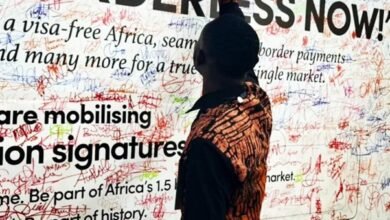Automotive: Côte d’Ivoire pursues its ambitions in the sector
By launching the production of minibuses « made in Côte d’Ivoire », Sotra and its Franco-Italian partner Iveco are betting on serving the growing needs of the local market, and beyond, those of the sub-region.
By Issiaka N’Guessan, in Abidjan
Amadou Koné, the Ivorian Minister of Transport was a happy man on Monday, January 10, 2022. He was certainly not exulting in front of the Prime Minister, Patrick Achi, and the other members of the government present. However, inviting the Franco-Congolese singer Youssoupha was indeed the sign of joy that shines through. The obvious reason is that the first minibuses « made in Côte d’Ivoire, » which came off the assembly line of the Société des transports abidjanais (Sotra), are here! Earlier, Patrick Achi arrived in one of these vehicles decked out in the national colors – orange, white and green – to inaugurate this production unit located in the Koumassi district, south of Abidjan.

The assembly line, the result of partnership between the Franco-Italian car manufacturer Iveco Group and Sotra, a company 60% owned by the Ivorian state and 40% by Iveco, required an investment of 45 billion CFA francs (70 million euros). It will have a production capacity of 1,000 vehicles (buses, construction trucks, ambulances, etc.) per year, which will be marketed under the Daily Ivoire brand.
« Expanding the fleet renewal process »
According to the Ivorian Prime Minister, this will help to « expand the process of renewing the [national] vehicle fleet. » The latter is the oldest in the ECOWAS region in 2018, « with an average age of 22 years, » said the Minister of Transport. That obsolescence « causes many deaths », according to the politician. Amadou Kone was however pleased that « thanks to the reforms undertaken since 2018 »- namely the implementation of measures to ban imports of certain used vehicles (editor’s note)- the country has « recorded an increase in sales of new vehicles of 20% per year […] ».

As a result, data provided by Minister of Trade and Industry, Souleymane Diarrassouba, who attended the inauguration of the assembly line, showed Côte d’Ivoire would be today « the 1st import market for new vehicles » in the WAEMU zone with « 23,797 units sold in 2021, compared to 12,753 units in 2018. A near doubling in the space of three years, indeed.
Objective, replacing vehicle imports by domestic production
From this point of view, the Ivorian government, by placing high priority on the industrial component in its National Development Plan (NDP 2021-2025), is seeking to capitalize on this new dynamic in order to gradually replace vehicle imports with domestic production. This would make financial sense by lightening the burden of foreign vehicle imports on the country’s balance of payments. But beyond these accounting elements, there is also and above all the desire to increase skills and create jobs. The Minister of Trade and Industry stressed that thanks to this assembly line, which will produce « 2 to 3 vehicles a day », « 1,500 indirect jobs are expected » and the order book is « full until 2024 ».
For his part, Amadou Koné has already announced the construction of a new « industrial zone for the automotive industry in San Pedro, » the second largest port city in Côte d’Ivoire, in the country’s southwest. « We will not stop here to help raise the profile of Côte d’Ivoire, we will create jobs by the thousand for executives and specialized jobs, » the Minister of Transport said during the launch of the assembly line of minibuses of Sotra.
Ambitions for sales in rest of sub-region
Better, Amadou Koné, has the ambition to see this Ivorian car production unit « take a sub-regional dimension » with sales announced in West and Central Africa on the network of Iveco Bus, technical partner of the project, and « 30% cheaper » than the equivalent imported vehicles. That objective is taken over by Minister of Trade and Industry, Souleymane Diarrassouba, who praised the ECOWAS market, with its 300 million inhabitants and the 1.3 billion inhabitants of the African continent, now accessible thanks to AfCFTA. More generally, with a market of about 1 million new vehicles per year, Africa remains the most under-motorized region in the world and therefore the one with the greatest potential for growth. This is a potentially very favorable configuration for investing in the sector on the continent.

As a sign of this interest, the Ministers of Transport of Benin, Cameroon, Central African Republic, Congo, Gabon, Equatorial Guinea, Madagascar, Mali, Mauritania, Niger, Senegal, Chad, Togo and the Union of Comoros followed this presentation of the first Sotra-IVECO vehicles by videoconference. As for the Burkinabe Ministers of Transport, Urban Mobility and Road Safety and of Transport and Communications of Guinea Bissau, they were present in Abidjan.






